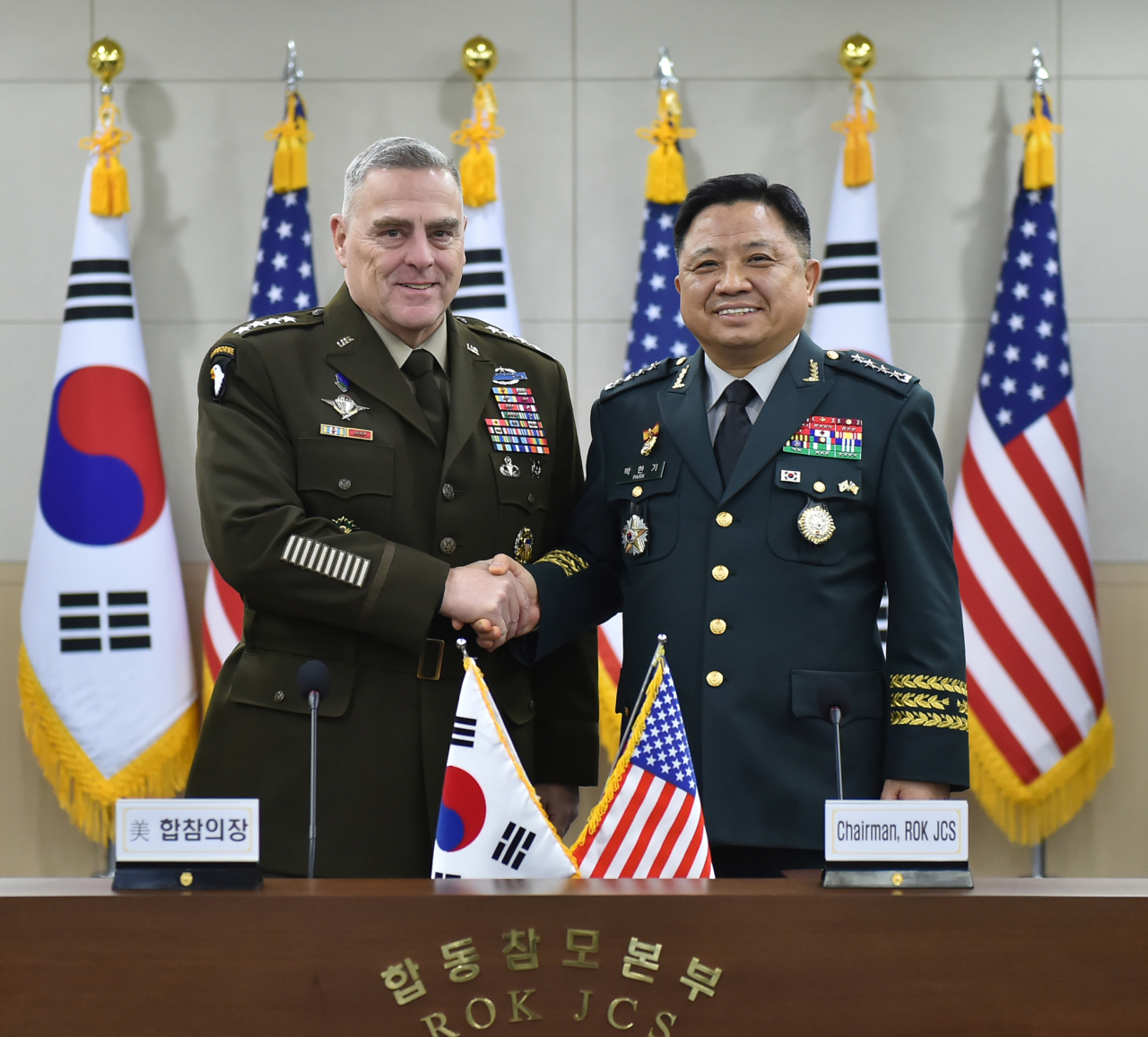The top military commanders of South Korea and the United States discussed the allies’ military readiness and the security situation on the Korean Peninsula at the 44th Military Committee Meeting in Seoul on Thursday.
South Korea’s Chairman of the Joint Chiefs of Staff Gen. Park Han-ki and his US counterpart Gen. Mark Milley were joined by some 20 officials from South Korea and 17 officials from the US, including US Indo-Pacific Command Commander Adm. Philip Davidson and US-ROK Combined Forces Command Commander Gen. Robert Abrams.
The joint press release issued at the end of the meeting said the two chairmen discussed the ongoing efforts of the two governments for the efficient transfer of wartime operational control authority from the current US-commanded Combined Forces Command to a ROK-commanded CFC. ROK refers to the official name of South Korea, the Republic of Korea.
 |
South Korea’s Chairman of the Joint Chiefs of Staff Gen. Park Han-ki (right) and his US counterpart, Chairman of the Joint Chiefs of Staff Gen. Mark Milley, pose at the Joint Chiefs of Staff headquarters in Yongsan, central Seoul. (Joint Chiefs of Staff) |
The two chiefs were also briefed on the results of Korea’s initial operational capability assessment conducted during a combined military exercise in August.
They reportedly reaffirmed that OPCON transfer is condition-based. In 2014, the two allies set three conditions that need to be fulfilled for wartime OPCON to be completely transferred to South Korea, during the 46th Security Consultative Meeting.
The three conditions are Seoul’s capability to lead the allies’ combined defense mechanism; its capacity for initial responses to the North’s nuclear and missile threats; and a stable security environment on the peninsula and in the region.
“Gen. Milley affirmed that the US remains prepared to respond to any attack on the Korean Peninsula, using the full range of US military capabilities,” the press release read.
The JCS also said Milley and Park acknowledged the critical nature of multinational partnerships and agreed to further strengthen efforts for regional peace and stability.
At the MCM, Milley reportedly called on South Korea to renew the General Security of Military Information Agreement with Japan. The South Korean government announced it would pull out from the intelligence-sharing pact after Japan imposed trade curbs against Seoul this summer.
South Korea maintains it will only reconsider its withdrawal from the agreement if Japan normalizes trade. GSOMIA is to expire at midnight on Nov. 23.
Washington -- which played a role in facilitating GSOMIA when it was signed in 2016 -- has raised concerns that scrapping the intelligence-sharing agreement would harm the trilateral security cooperation among South Korea, the US and Japan.
The results of the two JCS chiefs’ meeting is to be reported to the 51st SCM scheduled for Friday.
At the SCM, South Korean Defense Minister Jeong Kyeong-doo and US Secretary of Defense Mark Esper will discuss the results of the meeting and decide on the schedule to assess whether Korea has full operational control capability.
Milley arrived Wednesday from Japan, where he discussed the military intelligence-sharing agreement with Japanese Prime Minister Shinzo Abe.
The MCM has been hosted annually or during times of heightened tensions alternately by South Korea and the US since 1978.
By Jo He-rim (
herim@heraldcorp.com)




![[Herald Interview] 'Trump will use tariffs as first line of defense for American manufacturing'](http://res.heraldm.com/phpwas/restmb_idxmake.php?idx=644&simg=/content/image/2024/11/26/20241126050017_0.jpg)

![[Health and care] Getting cancer young: Why cancer isn’t just an older person’s battle](http://res.heraldm.com/phpwas/restmb_idxmake.php?idx=644&simg=/content/image/2024/11/26/20241126050043_0.jpg)

